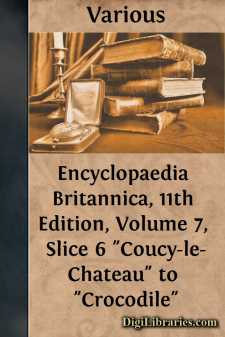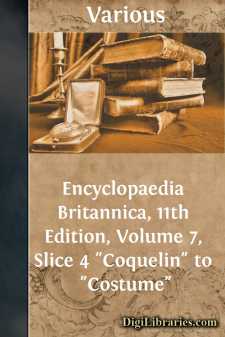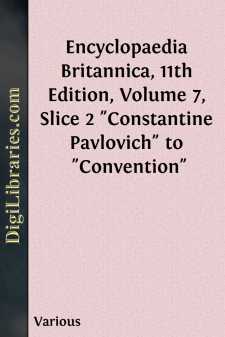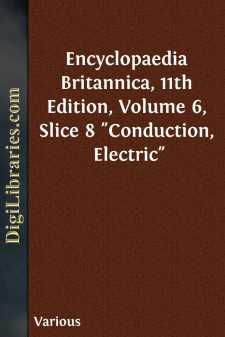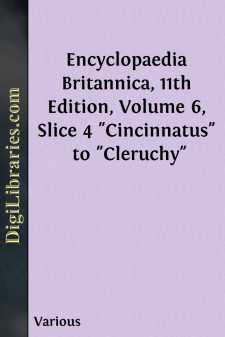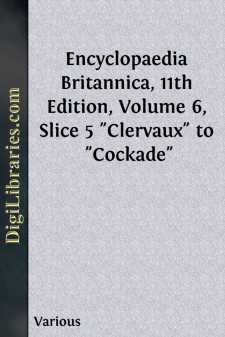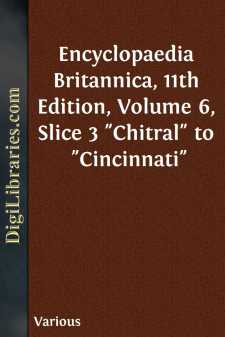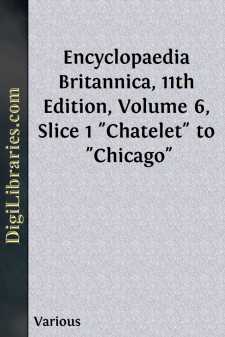Reference
- Atlases 1
- Bibliographies & Indexes 10
- Catalogs 55
- Dictionaries 1
- Encyclopedias
- Etiquette 14
- Handbooks & Manuals 19
- Heraldry 2
- Quotations 9
Encyclopedias Books
Sort by:
by:
Various
COUCY-LE-CHÂTEAU, a village of northern France, in the department of Aisne, 18 m. W.S.W. of Laon on a branch of the Northern railway. Pop. (1906) 663. It has extensive remains of fortifications of the 13th century, the most remarkable feature of which is the Porte de Laon, a gateway flanked by massive towers and surmounted by a fine apartment. Coucy also has a church of the 15th century, preserving a...
more...
by:
Various
COQUELIN, BENOÎT CONSTANT (1841-1909), French actor, known as Coquelin aîné, was born at Boulogne on the 23rd of January 1841. He was originally intended to follow his father’s trade of baker (he was once called un boulanger manqué by a hostile critic), but his love of acting led him to the Conservatoire, where he entered Regnier’s class in 1859. He won the first prize for comedy within a year,...
more...
by:
Various
(Lat. _conventio_, an assembly or agreement, from _convenire_, to come together), a meeting or assembly; an agreement between parties; a general agreement on which is based some custom, institution, rule of behaviour or taste, or canon of art; hence extended to the abuse of such an agreement, whereby the rules based upon it become lifeless and artificial. The word is of some interest historically and...
more...
by:
Various
CONSTANTINE PAVLOVICH (1779-1831), grand-duke and cesarevich of Russia, was born at Tsarskoye Selo on the 27th of April 1779. Of the sons born to the unfortunate tsar Paul Petrovich and his wife Maria Feodorovna, née princess of Württemberg, none more closely resembled his father in bodily and mental characteristics than did the second, Constantine Pavlovich. The direction of the boy’s upbringing...
more...
by:
Various
CONDUCTION, ELECTRIC. The electric conductivity of a substance is that property in virtue of which all its parts come spontaneously to the same electric potential if the substance is kept free from the operation of electric force. Accordingly, the reciprocal quality, electric resistivity, may be defined as a quality of a substance in virtue of which a difference of potential can exist between different...
more...
by:
Various
INITIALS USED IN VOLUME VII. TO IDENTIFY INDIVIDUALCONTRIBUTORS, WITH THE HEADINGS OF THEARTICLES IN THIS VOLUME SO SIGNED.A. B. F. Y.Alexander Bell Filson Young.Formerly Editor of theOutlook. Author ofChristopher Columbus;Master-singers;The Complete Motorist;Wagner Stories; &c.{Dance(in part).A. Bo.*Auguste Boudinhon, D.D., D.C.L.Professor of Canon Law in the Catholic University of Paris. Honorary...
more...
by:
Various
CINCINNATUS,LUCIUS QUINCTIUS, (b. c. 519B.C.), one of the heroes of early Rome, a model of old Roman virtue and simplicity. A persistent opponent of the plebeians, he resisted the proposal of Terentilius Arsa (or Harsa) to draw up a code of written laws applicable equally to patricians and plebeians. He was in humble circumstances, and lived and worked on his own small farm. The story that he became...
more...
by:
Various
CLERVAUX (clara vallis), a town in the northern province of Oesling, grand-duchy of Luxemburg, on the Clerf, a tributary of the Sûre. Pop. (1905) 866. In old days it was the fief of the de Lannoy family, and the present proprietor is the bearer of a name not less well known in Belgian history, the count de Berlaymont. The old castle of the de Lannoys exists, and might easily be restored, but its...
more...
by:
Various
CHITRAL, a native state in the North-West Frontier Province of India. The state of Chitral (see also ) is somewhat larger than Wales, and supports a population of about 35,000 rough, hardy hillmen. Previous estimates put the number far higher, but as the Mehtar assesses his fighting strength at8000 only, this number is probably not far wrong. Both the state and its capital are called Chitral, the...
more...
by:
Various
CHÂTELET (from Med. Lat. castella), the word, sometimes also written castillet, used in France for a building designed for the defence of an outwork or gate, sometimes of great strength or size, but distinguished from the château, or castle proper, in being purely defensive and not residential. In Paris, before the Revolution, this word was applied both to a particular building and to the...
more...


